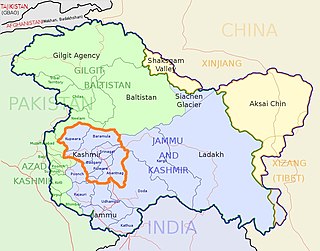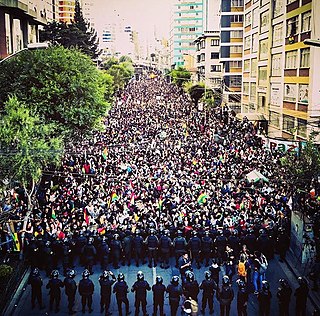
A police riot is a riot carried out by the police; a riot that the police are responsible for instigating, escalating or sustaining as a violent confrontation; an event characterized by widespread police brutality; a mass police action that is violently undertaken against civilians for the purpose of political repression. The term "police riot" was popularized after its use in the Walker Report, which investigated the events surrounding the 1968 Democratic National Convention in Chicago to describe the "unrestrained and indiscriminate" violence that the police "inflicted upon persons who had broken no law, disobeyed no order, made no threat." In this sense a police riot refers to rioting carried out by the police rather than a riot carried out by people who may be motivated to a greater or lesser degree by grievances with the police.

A nonviolent revolution is a revolution using mostly campaigns with civil resistance, including various forms of nonviolent protest, to bring about the departure of governments seen as entrenched and authoritarian. While many campaigns of civil resistance are intended for much more limited goals than revolution, generally a nonviolent revolution is characterized by simultaneous advocacy of democracy, human rights, and national independence in the country concerned. In some cases a campaign of civil resistance with a revolutionary purpose may be able to bring about the defeat of a dictatorial regime only if it obtains a degree of support from the armed forces, or at least their benevolent neutrality.

A demonstration is action by a mass group or collection of groups of people in favor of a political or other cause or people partaking in a protest against a cause of concern; it often consists of walking in a mass march formation and either beginning with or meeting at a designated endpoint, or rally, to hear speakers. It is different from mass meeting.

The 2010 Kashmir unrest was a series of violent protests and riots in the Kashmir Valley which started in June 2010 after the Indian Army claimed to have killed three "Pakistani infiltrators" in which a soldier of the Territorial Army, a counter-insurgent and a former special police officer had found three young men from their Nadihal village in Baramulla district and killed them in a staged encounter at Sona Pindi. The protests occurred in a movement launched by Hurriyat Conference led by Syed Ali Shah Geelani and Mirwaiz Umar Farooq in the Indian state of Jammu and Kashmir in June 2010, who called for the complete demilitarisation of Jammu and Kashmir. The All Parties Hurriyat Conference made this call to a strike, citing human rights abuses by security forces. Rioters shouting pro-independence slogans, defied curfew, attacked riot police with stones and burnt vehicles and buildings. The protests started out as anti India protests but later were also targeted against the United States following the 2010 Qur'an-burning controversy. The riot police consisting of Jammu and Kashmir Police and Indian Para-military forces fired teargas shells rubber bullets and also live ammunition on the protesters, resulting in 112 deaths, including many teenagers and an 11-year-old boy. The protests subsided after the Indian government announced a package of measures aimed at defusing the tensions in September 2010.

The Jordanian protests were a series of protests in Jordan that began in January 2011, and resulted in the firing of the cabinet ministers of the government. In its early phase, protests in Jordan were initially against unemployment, inflation, corruption. along with demanding for real constitutional monarchy and electoral reforms.

The 2011–13 protests in Sudan began in January 2011 as part of the Arab Spring regional protest movement. Unlike in other Arab countries, popular uprisings in Sudan had succeeded in toppling the government prior to the Arab Spring in 1964 and 1985. Demonstrations in Sudan however were less common throughout the summer of 2011, during which South Sudan seceded from Sudan, but resumed in force later that year and again in June 2012, shortly after the government passed its much criticized austerity plan.
The 2011–2012 Kurdish protests in Turkey are ongoing protests in Turkey, led by the Peace and Democracy Party (BDP), against restrictions of Kurdish rights by of the country's Kurdish minority's rights. Although they are the latest in a long series of protest actions by Kurds in Turkey, they are strongly influenced by the concurrent popular protests throughout the Middle East and North Africa, and the Turkish publication Hürriyet Daily News has suggested that the popularly dubbed "Arab Spring" that has seen revolutions in Egypt and Tunisia may lead to a "Kurdish Summer" in the northern reaches of the Middle East. Protesters have taken to the streets both in İstanbul and in southeast Turkey, with some demonstrations also reported as far west in Anatolia as İzmir.

The following is a timeline of the Bahraini uprising from February to March 2011, beginning with the start of protests on February 2011 and including the Saudi-backed crackdown from 15 March.
The following is an incomplete timeline of events that followed the Bahraini uprising of 2011 from September 2012 onward.
The Arab Spring unrests and revolutions unfolded in Tunisia, Egypt, Libya, Yemen, Syria and Bahrain, and in the rest of the region, some becoming violent, some facing strong suppression efforts, and some resulting in political changes.

The civil uprising phase of the Syrian Civil War, or as it was sometimes called by the media, the Syrian Revolution, was an early stage of protests – with subsequent violent reaction by the Syrian Arab Republic – lasting from March to 28 July 2011. The uprising, initially demanding democratic reforms, evolved from initially minor protests, beginning as early as January 2011 and transformed into massive protests in March.

The anti-austerity movement in Greece involves a series of demonstrations and general strikes that took place across the country. The events, which began on 5 May 2010, were provoked by plans to cut public spending and raise taxes as austerity measures in exchange for a €110 billion bail-out, aimed at solving the Greek government-debt crisis. Three people were killed on 5 May in one of the largest demonstrations in Greece since 1973.
The 2015 May Day protests were a series of international protests involving tens of thousands of people that took place worldwide on May Day over austerity measures and poor working conditions.

The 2017–18 Togolese protests are a significant representation of civil unrest in Togo and against the 50 year rule of the father-son combination of Gnassingbé Eyadéma and Faure Gnassingbé. The protesters demanded that the president honour the 1992 constitution, and demanding that he step down immediately. Gnassingbé offered the protesters the option of enacting the two-term limit set in the constitution effective from 2018, thus ensuring that he could stay in power until 2030. This has been rejected by the opposition. However, on 8 May 2019 the Togolese Parliament voted unanimously to accept this amendment and imposed this non-retroactive term limit on the president's office.

Protests against Faure Gnassingbé have occurred throughout Togo, starting when President Faure Gnassingbé assumed power after the death of his father Gnassingbé Eyadéma in February 2005.

Iván Duque Márquez is a Colombian politician and lawyer who is the current President of Colombia, in office since 7 August 2018. He was elected Colombia's youngest president, as the candidate from the Democratic Centre Party in the 2018 presidential election. Backed by his mentor, ex-president Alvaro Uribe, he ran a campaign where he stood against the peace treaty with the guerilla group FARC.

Civil protests are taking place in Lebanon, initially triggered by planned taxes on gasoline, tobacco and VoIP calls on applications such as WhatsApp, but quickly expanding into a country-wide condemnation of sectarian rule, stagnant economy, unemployment, endemic corruption in the public sector, legislation that is perceived to shield the ruling class from accountability and failures of the government to provide basic services such as electricity, water and sanitation. The protests first erupted on 17 October 2019. It has been 144 days since they have started.

The 2019–20 Iraqi protests, also called the October Revolution are an ongoing series of protests that consisted of demonstrations, marches, sit-ins and civil disobedience. They started on 1 October 2019, a date which was set by civil activists on social media, spreading over the central and southern provinces of Iraq; to protest corruption, unemployment and inefficient public services. The protest then escalated into full-scale calls to overthrow the administration and to stop Iranian intervention in Iraq. The Iraqi government has used live bullets, marksmen, hot water, hot pepper gas and tear gas against protesters, leading to many deaths and injuries.

The 2019 Latin American protests correspond to a series of protests all over Latin America that coincided in 2019, and that is part of a larger context of international contestation movements since the end of 2018. Some of these protests continued into 2020.

The Citizenship Amendment Act (Bill) protests, also known as CAA Protest or CAB Protest, occurred after the Citizenship Amendment Act (CAA) was enacted by the Government of India on 12 December 2019. The move sparked a widespread national and overseas ongoing protests against the act and its associated proposals of the National Register of Citizens (NRC). The protests first began in Assam and spread swiftly in other states such as Delhi, Meghalaya, Arunachal Pradesh, and Tripura on 4 December 2019. Protests broke out rapidly across the country, although the concerns of the protesters vary.

















